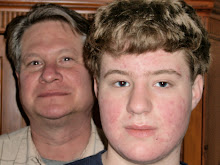Released: 1958
Genre: Senseless Western
Notable for: Eastwood's self-described career low
Clint's subliminal message: "Watch! My character can grow!"

Never before in the history of human experience have two people been more thrilled to watch a movie famous only for being bad.
Clint Eastwood himself called "Ambush at Cimarron Pass" the worst western ever made. He told one interviewer it was a low point of his life. Not his acting career, his life. Click here to watch 1974 video in which Clint calls it "almost the picture that made me quit."
Who the hell cares? We almost danced as we sat down with spicy Italian sandwiches to watch.
Excitement springs from the fact "Ambush at Cimarron Pass" is the last of 11 films, mostly steaming turds, that featured glimpses of Eastwood before he had fame or following. Six months after this movie, he landed his TV role on "Rawhide" and became comfortably established.
In other words, from now on we can watch real Clint Eastwood movies. Yee-ha!
The Clint Eastwood Project has been accurately described as an absurd completist task. The most absurd part was bothering to include these first 11 films. Yet we are now glad we did, for two reasons.
Reason one: Enduring these films makes a viewer appreciate how tough, humiliating and frustrating it was for Eastwood (aside from screwing starlets) to establish his career. His was a working man's struggle (again, except for coitus with starlets) and we suspect it helped to shape Clint's iconic appeal to regular guys.
Reason two: It is very masculine to set out to do something stupid and then do it. A man finishes what he starts, no matter how absurd. It feels good.
Perhaps the tingly feeling clouded our judgment but it seemed like Clint exaggerates the wretchedness of "Ambush at Cimarron Pass."
Make no mistake, it's bad. The acting is sometimes laughable. The plot often makes no sense. Indians are portrayed as stereotypical savages. Half the characters, including Clint, are former Confederate soldiers but no one has a southern accent. Everyone in the film sounds like they come from Dayton, Ohio, except for the lone female character. Her main dramatic function is a continual display of cleavage, and she speaks with perhaps the worst Mexican accent ever recorded on film.
But it is not the worst Western ever made. It's not even the worst film Clint Eastwood ever made.
Clint, for the first time, had a central role in "Ambush at Cimarron Pass." He received third billing. He played a young hothead who fought for the Confederacy and remains bitter two years after the Civil War. He and a bunch of fellow ex-Confederates meet up with a patrol of Union soldiers and everyone joins forces to fight bloodthirsty Injuns.

For the first time in Clint's acting career, his character grows and develops. He plays a Mr. Williams from Macon, Ga., who at first says a lot of things like, "He's a liar! All Yankees are liars." Later he gets into a fistfight with the Yankee commander and, for probably the last time in his movie career, Clint is beaten in two punches. That's sad to see. But by the end of the movie Clint comes to recognize and respect the goodness in his former enemies.
He even delivers the last line in a nonsensical final scene meant to drive home the point this was not a story about fighting Indians. It was a story of a divided nation coming together.
"Sometimes you've got to lose before you finally win," Clint says.
Word, dude. Speaking as two males who get to watch "A Fistful of Dollars" next week, we agree.
Next up: Well, you know.






